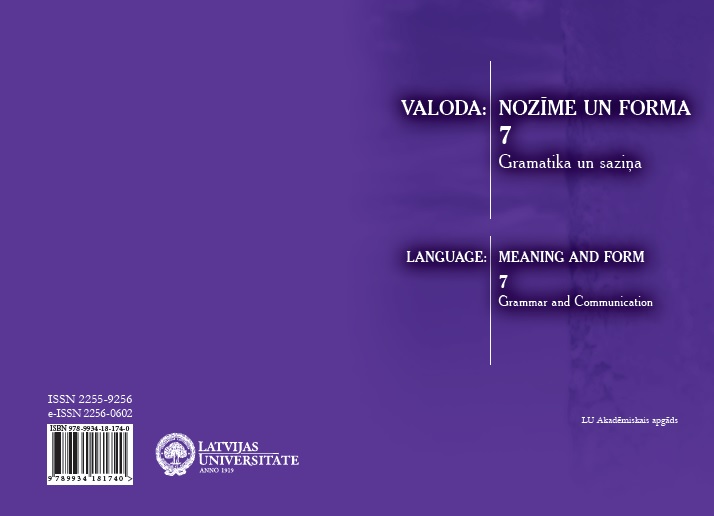Latviešu valodas lokāmie divdabji sekundāri predikatīvā funkcijā
Declinable participles in Latvian as secondary predicative components
Author(s): Agita KazakevičaSubject(s): Language and Literature Studies, Theoretical Linguistics, Applied Linguistics, Baltic Languages
Published by: Latvijas Universitātes Akadēmiskais apgāds
Keywords: sekundāri predikatīvs komponents; lokāmie divdabji; apzīmētāja, izteicēja un sekundāri predikatīva komponenta robežgadījumi;
Summary/Abstract: The article focuses on secondary predicative uses of Latvian declinable participles. Participial clauses, despite their being very widespread, have been excluded from this study due to the fact that only two kinds of participles are capable of entering into this sort of syntactic construction, while the main objective of the study has been to see whether the claim expressed in the “Grammar of Latvian” (Latviešu valodas gramatika, 2013) to the effect that all Latvian participles are capable of functioning as secondary predicative components also holds true for contemporary periodicals and literary prose texts, as well as to identify and analyse functionally borderline cases.The data confirms that all Latvian participles (declinable, in this case) can function as secondary predicative components, although, importantly, declinable present tense participles, especially those ending in ošs, oša, are very rarely used in this way, attributive use being by far more typical. This can be explained by the fact that adjectival meaning is actually more strongly expressed in these participles than their verbal semantics (as is well known, declinable participles have both (Lokmane 2006, 226)). Ever since the “Grammar of Modern Standard Latvian” (Mūsdienu latviešu literārās valodas gramatika, 1959, 639) declinable past tense active voice participles have been recognized as having the highest frequency of use among participles in Modern Latvian. The same can be confidently stated about their frequency of use as secondary predicative components in the 21st century (see, e.g., Nītiņa 2013, 573).
Journal: Valoda: nozīme un forma
- Issue Year: 2016
- Issue No: 7
- Page Range: 70-76
- Page Count: 7
- Language: Latvian

